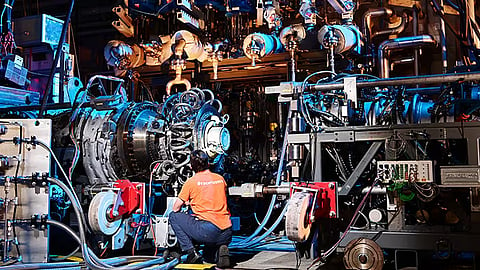Rolls-Royce Marks Milestone in Enabling Hydrogen as Aviation Fuel
Rolls-Royce has announced a further key milestone as a world industry first has been achieved in its hydrogen research project that aims to make hydrogen-fueled combustion engines for aircraft a reality in the near future.
Both Rolls-Royce and its partner easyJet are committed to being at the forefront of the development of hydrogen combustion engine technology capable of powering a range of aircraft, including those in the narrow-body market segment, from the mid-2030s onwards.
Now, working with Loughborough University in the UK and the German Aerospace Centre Deutsches Zentrum für Luft-und Raumfahrt (DLR), Rolls-Royce has proven a critical engine technology that marks another significant step in the journey to enabling hydrogen as an aviation fuel.
Tests on a full annular combustor of a Pearl 700 engine at DLR in Cologne running on 100% hydrogen have proven the fuel can be combusted at conditions that represent maximum take-off thrust.
Rolls-Royce Successfully Tests UltraFan Technology Demonstrator
Key to that achievement has been the successful design of advanced fuel spray nozzles to control the combustion process. This involved overcoming significant engineering challenges as hydrogen burns far hotter and more rapidly than kerosene.
The new nozzles were able to control the flame position using a new system that progressively mixes air with the hydrogen to manage the fuel’s reactivity. Rolls-Royce is pleased to confirm that combustor operability and emissions were both in line with expectations.
Grazia Vittadini, Chief Technology Rolls-Royce, said: "This is an incredible achievement in a short space of time. Controlling the combustion process is one of the key technology challenges the industry faces in making hydrogen a real aviation fuel of the future.
"We have achieved that, and it makes us eager to keep moving forward. I want to thank easyJet, Loughborough University and DLR for their dedication and support to reach this milestone.”
Johan Lundgren, CEO of easyJet, said: "We believe hydrogen is the future of short-haul aviation and the success of this test and progress being made demonstrates that this is becoming ever closer.
"We remain optimistic that it will play a critical role in helping us achieve the ambitious goals we set out in our net zero roadmap.”
The technologies tested at Loughborough and DLR will now be incorporated into the learning from the Boscombe Down tests as Rolls-Royce and easyJet prepare for the next stage of testing – a full gas hydrogen ground test on a Pearl engine.
That will in turn lead to a full ground test on a Pearl engine using liquid hydrogen – both easyJet and Rolls-Royce have a shared ambition to then take the technology to flight.
Read More: Rolls-Royce Successfully Tests mtu Engines with Pure Hydrogen


